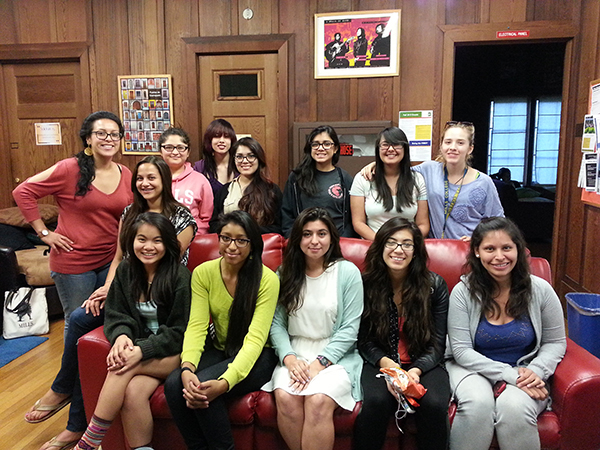
Mills First is a newly formed club for students who are the first in their family to attend a college or university. The main focus of the club is to create a safe space for these first-generation students to discuss their day-to-day experiences, and to act as a resource for those seeking emotional support.
Kimberly Septien, a sophomore and the club’s publicity chair, said her her biggest challenge in her first year at Mills was seeking resources.
“Personally I am always hesitant to reach out,” she said. “I went to psychological counseling. At the time I was hesitant to go because I was embarrassed, but I’m sharing this with you because I know it’s nothing to be embarrassed about.”
Septien said she feels that asking for help is viewed as a sign of weakness, which is one of the primary reasons she decided to participate in Mills First: to deconstruct the stigma of asking for help.
For Jazmin Romero, a sophomore and Mills First’s president, adjusting to a new environment was one of many challenges she faced as a first-generation student.
“It wasn’t a very positive [experience],” Romero said. “I had a very hard time being here at Mills.”
“I felt like I wasn’t accepted because I was first gen and a woman of color,” she said, tearing up.
Romero recalls feeling uncomfortable during a residential hall meeting.
“There is just a division with people in my hall,” she said. “I couldn’t believe this division was there.”
Luckily, Romero participated in the Summer Academic Workshop (SAW), an intensive four-week academic college prep program designed for incoming first-generation, low income students, which gave her a feeling of support while starting her first semester at Mills.
The SAW program invites the participation of students who have indicated they are first-generation students on their application for Mills or to their admissions counselor. But as of now the program can only accept 15 to 20 students due to budget constraints. According to Lauren Bartlett, SAW 2008 alum and Diversity and Social Justice Resource Center coordinator, the selection process is currently undergoing some changes.
“In addition to the Mills application, students will be given an opportunity to apply into the program,” Bartlett said.
However, Romero’s reason for starting Mills First was to provide a support system for other first generation students who did not have the opportunity to attend SAW.
For some first-generation students, prior to Mills academic spaces did not use or discuss the term “first generation.” Margarita Sánchez Morales, a sophomore and club member, said because of this it was difficult to find resources or a supportive community in her first year.
“I didn’t know that [first generation] was part of my identity,” she said. “I felt really excluded and I felt left out. I didn’t feel comfortable attending their [Summer Academic Workshop] events.”
Throughout the academic year, the Diversity and Social Justice Resource Center provides workshops for students who participated in SAW as well as all first generation students. For example, a program called Being the First, started by Sabrina Kwist, director and supervisor of the Diversity and Social Justice Resource Center, and one of her student workers. This program seeks to provide the same resources during the academic year that the SAW program does during the summer.
However, Bartlett said she understands that Being the First cannot fully recreate the SAW cohort experience, and also that the Diversity and Social Justice Resource Center fully supports Mills First.
“What’s nice about the Mills First club is that it is student-run [and] student-created, and that allows students to feel like they have more agency and personal space,” Bartlett said.
Now a sophomore, Morales describes her appreciation for the community Mills First has created.
“I really like that this space allows for everyone that identifies as first generation to come together,” Morales said.
Karen Correa, sophomore and treasurer of Mills First, spoke of promoting advocacy and education for the needs of first generation students as one of her goals based on her experience.
“There wasn’t a space where I could go and feel accepted,” she said. “I always felt that me being first generation caused me to have a lot of barriers.”
Correa speaks about the difficulties of her experience on the crew team and in the Athletics Physical Education Recreation (APER) department.
“I failed my swim test because I never had the opportunity to swim till I came to Mills,” she said. After failing the test, Correa had to wear a life vest, which she described as “one of the worst experiences at Mills.”
“It’s not only me being first gen but also my class background,” she said, “and I felt like that sometimes plays a role.”
Correa looks forward to speaking with APER about being more aware of the experiences of first-generation students.
As well as providing a safe space, Mills First plans to play movies about people being the first to do something, according to Romero. The club also wants community members to know there will be opportunities for the campus and allies to get involved. However, the main focus of Mills First is to cater to first-generation students.
“We don’t want first-generation students to feel like they are alone,” Correa said.
When asked why this group of sophomores decided to come back to Mills after a rocky start, they all echoed the need start what they finished, to be resilient, and to persevere.
“If it’s easy, is it really worth doing?” Septien asked.
Mill First meets Wednesdays at 6:30 p.m. in the Solidarity Lounge.

